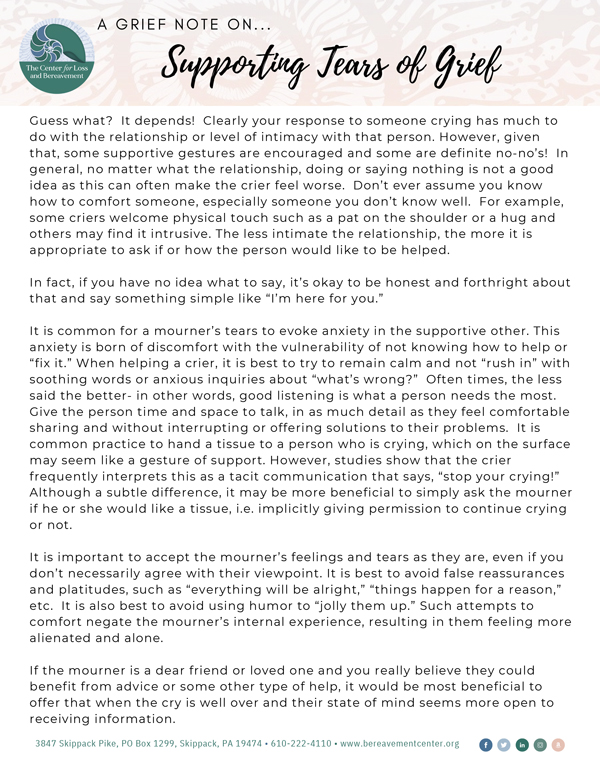CLB Grief Notes
A Grief Note On…
Supporting Tears of Grief
Guess what? It depends! Clearly your response to someone crying has much to do with the relationship or level of intimacy with that person. However, given that, some supportive gestures are encouraged and some are definite no-no’s! In general, no matter what the relationship, doing or saying nothing is not a good idea as this can often make the crier feel worse. Don’t ever assume you know how to comfort someone, especially someone you don’t know well. For example, some criers welcome physical touch such as a pat on the shoulder or a hug and others may find it intrusive. The less intimate the relationship, the more it is appropriate to ask if or how the person would like to be helped.
In fact, if you have no idea what to say, it’s okay to be honest and forthright about that and say something simple like “I’m here for you.”
It is common for a mourner’s tears to evoke anxiety in the supportive other. This anxiety is born of discomfort with the vulnerability of not knowing how to help or “fix it.” When helping a crier, it is best to try to remain calm and not “rush in” with soothing words or anxious inquiries about “what’s wrong?” Often times, the less said the better- in other words, good listening is what a person needs the most. Give the person time and space to talk, in as much detail as they feel comfortable sharing and without interrupting or offering solutions to their problems. It is common practice to hand a tissue to a person who is crying, which on the surface may seem like a gesture of support. However, studies show that the crier frequently interprets this as a tacit communication that says, “stop your crying!” Although a subtle difference, it may be more beneficial to simply ask the mourner if he or she would like a tissue, i.e. implicitly giving permission to continue crying or not.
It is important to accept the mourner’s feelings and tears as they are, even if you don’t necessarily agree with their viewpoint. It is best to avoid false reassurances and platitudes, such as “everything will be alright,” “things happen for a reason,” etc. It is also best to avoid using humor to “jolly them up.” Such attempts to comfort negate the mourner’s internal experience, resulting in them feeling more alienated and alone.
If the mourner is a dear friend or loved one and you really believe they could benefit from advice or some other type of help, it would be most beneficial to offer that when the cry is well over and their state of mind seems more open to receiving information.
Join Our
Mailing List
Donate
Today
Request
Information

Affiliations
• NACG
• CBEM Changemaker
• ADEC
• Charity Navigator
Quick Links
About Us
Individual & Family Grief Counseling
Volunteer
News
Grief Support Resources
Contact
Ph: 610-222-4110
Fax: 610-222-4116
3847 Skippack Pike
P.O. Box 1299
Skippack, PA 19474
Support The Center For
Loss and Bereavement
